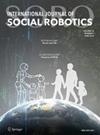自主系统和技术阻力:监测接受、信任和容忍的新工具
IF 3.8
2区 计算机科学
Q2 ROBOTICS
引用次数: 0
摘要
我们介绍了自主人工智能体的容忍概念(及其对立概念,不容忍),激励其在社交机器人和人类智能体交互领域的理论采用,在那里它可以有效地补充两个连续的,但本质上不同的结构-接受和信任-被研究人员广泛使用。我们提供了一个全面的宽容概念模型,将其解释为用户对自主性隔阂的不敏感或恢复力(即,由于正确或错误的原因,相信机器人可以颠覆和/或控制他们的生活的人类所经历的不可思议的孤立和位移感)。我们也用不容忍来表示相反的属性,即用户对自治疏远的敏感性或倾向性。因此,宽容和不宽容是同一现象连续体的逆表示,宽容减少时不宽容增加,反之亦然。虽然接受度和信任度衡量用户与特定机器人的互动是否令人满意和有效,但二分制宽容/不宽容反映了用户的态度如何受到对机器人根深蒂固的规范信念的影响。如此定义,低耐受性(即高耐受性)预计与对采用前景的对抗反应相关:具体来说,不宽容的态度预测了对agent的焦虑和敌对行为,这些行为源于对自治系统可能会严重破坏人类生活(影响他们的工作文化、生活方式、价值体系等)或支配人类(使人类冗余、破坏他们的权威、威胁他们的独特性等)的担忧。因此,对代理人的消极信念和世界观是对代理人的不宽容态度的原因,这预示着自主性隔阂,自主性隔阂反过来又与低采纳倾向和回避和拒绝行为相关。本文章由计算机程序翻译,如有差异,请以英文原文为准。
Autonomous Systems and Technology Resistance: New Tools for Monitoring Acceptance, Trust, and Tolerance
Abstract We introduce the notion of Tolerance for autonomous artificial agents (and its antithetical concept, Intolerance ), motivating its theoretical adoption in the fields of social robotics and human—agent interaction, where it can effectively complement two contiguous, but essentially distinct, constructs— Acceptance and Trust— that are broadly used by researchers. We offer a comprehensive conceptual model of Tolerance, construed as a user’s insusceptibility or resilience to Autonomy Estrangement (i.e., the uncanny sense of isolation and displacement experienced by the humans who believe, for right or wrong reasons, that robots can subvert and/or control their lives). We also refer to Intolerance to indicate the opposite property, that is the user’s susceptibility or proneness to Autonomy Estrangement. Thus, Tolerance and Intolerance are inverse representations of the same phenomenological continuum, with Intolerance increasing when Tolerance decreases and vice versa. While Acceptance and Trust measure how the user’s interaction with a particular robot is satisfying and efficacious, the dyad Tolerance/Intolerance reflects how the user’s attitude is affected by deeply held normative beliefs about robots in general. So defined, a low Tolerance (that is a high Intolerance) is expected to correlate to antagonistic responses toward the prospect of adoption: specifically, Intolerant attitudes predict the kind of anxious and hostile behaviours toward Agents that originate from the concerns that autonomous systems could deeply disrupt the lives of humans (affecting their work cultures, ways of living, systems of values, etc.) or dominate them (making humans redundant, undermining their authority, threatening their uniqueness, etc.). Thus, Negative beliefs and worldviews about Agents are the cause of the Intolerant attitude toward Agents, which predicts Autonomy Estrangement, which in turn correlates to low Adoption Propensity and avoidance and rejection behaviours.
求助全文
通过发布文献求助,成功后即可免费获取论文全文。
去求助
来源期刊

International Journal of Social Robotics
ROBOTICS-
CiteScore
9.80
自引率
8.50%
发文量
95
期刊介绍:
Social Robotics is the study of robots that are able to interact and communicate among themselves, with humans, and with the environment, within the social and cultural structure attached to its role. The journal covers a broad spectrum of topics related to the latest technologies, new research results and developments in the area of social robotics on all levels, from developments in core enabling technologies to system integration, aesthetic design, applications and social implications. It provides a platform for like-minded researchers to present their findings and latest developments in social robotics, covering relevant advances in engineering, computing, arts and social sciences.
The journal publishes original, peer reviewed articles and contributions on innovative ideas and concepts, new discoveries and improvements, as well as novel applications, by leading researchers and developers regarding the latest fundamental advances in the core technologies that form the backbone of social robotics, distinguished developmental projects in the area, as well as seminal works in aesthetic design, ethics and philosophy, studies on social impact and influence, pertaining to social robotics.
 求助内容:
求助内容: 应助结果提醒方式:
应助结果提醒方式:


